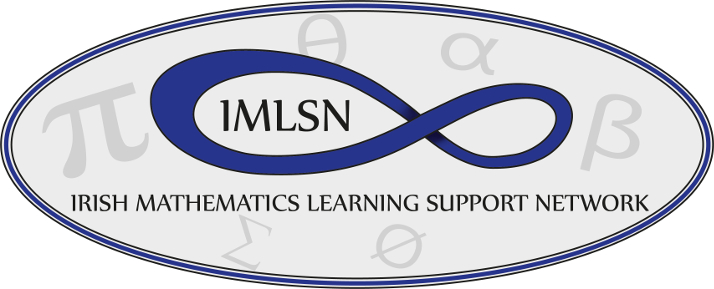The third in the series of Virtual IMLSN Workshops, Maths Support in Covid Times Workshop 3, took place on Thursday 21st January via Zoom. IMLSN would like to thank all those who contributed to this meeting - participants, facilitators and note takes.
The meeting started with a welcome note and brief introduction from, the chair of IMLSN, Dr Kirsten Pfeiffer, attendees were invited to get involved with IMLSN, either as committee members or through the website. Participants were advised of recent National Forum funding received by IMLSN and encouraged to share any useful resources / links for dissemination through the website. Following this participants joined discussion groups in breakout rooms. Conversations focussed on three questions:
- How have things gone with online support ? Any Lessons Learnt?
- What worked and what didn’t work to encourage engagement with online MLS?
- Ideas / suggestions for the new resources on website? – Top 5 resources
Contributions & Discussion points:
- How have things gone with online support ? Any Lessons Learnt?
Adjusting to new environment:
- Many tutors and students started out lacking in confidence because of the changed environment and lack of experience with technology. This situation improved as time went on and the online experience became easier and more enjoyable.
- Internet and technology issues caused some problems.
Pattern of Engagement:
- Engagement was slow at the start and tailed off towards the end of the semester. MLC engagement has improved better; Normal drop-in low but study groups used a lot, in particular the Chat associated with them.
- Some institutes noted more uptake for MLS in Semester 1 2020/2021 than in Semester 2 2019/2020, but some observed that engagement was still down on normal levels.
- Better engagement from first years.
- High level of attendance in MLC but 1st year students hesitant to engage.
- One-to-one bookable sessions busy but numbers for drop-in sessions are the same as normal.
Different offerings:
- Group and individual sessions worked depending on the students.
- Study groups were introduced in a number of institutions – to varying degrees of success. In one institution, offering study groups to all ungraduated groups, 600 students signed up for these sessions; Study groups focussed on topics relevant to weekly tutorial exercises; Max of 5 students per study group.
- Targeted one-to-one supports for students with disabilities and mature students;
- Drop-in Sessions, where a student clicks on the link displayed on the MLC timetable and then they will enter a virtual drop-in. The sessions are offered each day Monday to Friday with sessions spread across the day.
- Consultation Session where a member of staff is available to offer help and advice with Mathematics or Statistics – these must be pre-booked as lots interested in these sessions.
- Drop-in sessions – using one main room, manned by a member of support staff, and a number of break-out rooms, through which a second member of support staff wanders, answering questions and interactive with students on a one-to-one basis. Students more willing to ask questions in smaller rooms.
- Students were auto-enrolled on a canvas module for Maths support.
Outcomes:
- One lecturer, who had created an interactive website, involving quizzes built on an extensive question bank with detailed solutions, tailored to Business Maths module(s), reported a marked increase in the performance of students in this group - the number of students achieving a A grade went up from about 5% to 40%;
- One institution, observed that the online environment opened things up more. More students could be accommodated as they were not limited by physical space.
- What worked and what didn’t work to encourage engagement with online MLS?
Raising Awareness of services:
- Sending out a Microsoft Form to identify the interested students, following up on it.
- One institution made use of a Microsoft Form Survey and any student who expressed an interest in MLS were contacted back.
- Having the Maths Centre symbol on emails to students helped to highlight messages in students’ overburdened email accounts.
- Emails to students - noted spikes in use of MLS directly after emails sent to students.
- Lecturers constantly encouraged students to utilise the centre.
- Mentions of the MLS sessions in tutorials and lectures.
- Specific recommendation to individual students to make use of MLS.
- Video tailored to each cohort and posted on the Moodle page.
- Useful to use Moodle calendar to create slots to share among the students ( for anyone using Moodle as their VLE)
Different offerings:
- Small group sessions worked much better than drop-in.
Getting feedback:
- Surveying students at the end of semester is important.
Issues identified:
- Students confused tutorials with support sessions.
- Students less willing to engage / ask questions as spotlight was on the more so felt it was difficult to ask questions.
- Ideas / suggestions for the new resources on website? – Top 5 resources
- Suite of short 10 minute videos on topics.
- Mathcentre leaflets.
- Playlists
- Fundamentals of OneNote for tutors.
- The point was made that the different profiles of students would have to be taken account of when considering resources ( i.e. what might considered ‘basic’ in one institution might be different in another).
- Also suggestion made to start by considering the TALMO website.
- Dedicated support module in institute VLE.
- Use a QR code on noticeboards, with a link to a form that students can email for support. (Another student indicated they had tried QR codes but they had not been very successful).
The meeting concluded with a short report from each breakout room – as summarised above. Participants were asked to complete a follow-up survey on useful resources.
A pdf of this report can be downloaded here.

